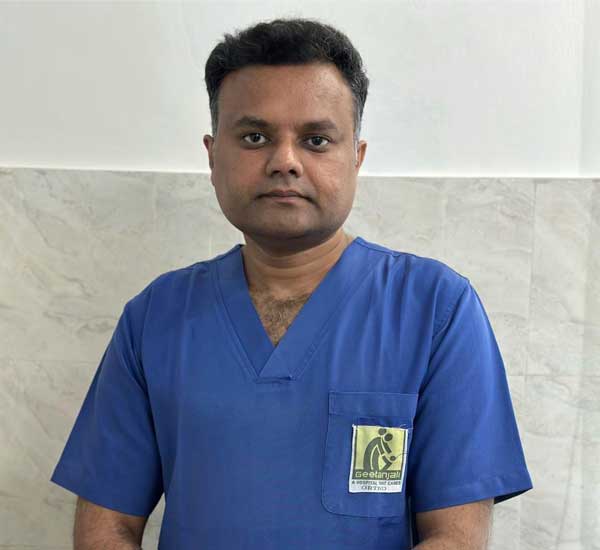We at Geetanjali Hospital organize special Free Asthmatic Cure Camp on 7th of every month, with our outdoor and indoor specialist cure the patients.
We at Geetanjali Hospital organize special Asthmatic Cure Camp on 7th of every month, with our outdoor and indoor specialist cure the patient. This camp proved to be very beneficial to all the patients facing problems and certain complications due to Asthma over the years in Hisar and adjoining areas. We try to provide the best of the help to the Asthmatic-victim to make him perfectly feel normal.
ATTEND AND FEEL THE DIFFERENCE
DATE:-7TH OF EVERY MONTH
VENUE:-GEETANJALI HOSPITAL, Hisar
Asthma is a chronic inflammation of the bronchial tubes (airways) that causes swelling and narrowing (constriction) of the airways. The result is difficulty breathing. The bronchial narrowing is usually either totally or at least partially reversible with treatments. Asthma affects people differently. Each individual is unique in their degree of reactivity to environmental triggers. This naturally influences the type and dose of medication prescribed, which may vary from one individual to another
Your doctor may refer to asthma as being “extrinsic” or “intrinsic.” A better understanding of the nature of asthma can help explain the differences between them. Extrinsic, or allergic asthma, is more common (90% of all cases) and typically develops in childhood. Approximately 80% of children with asthma also have documented allergies. Typically, there is a family history of allergies. Additionally, other allergic conditions, such as nasal allergies or eczema, are often also present. Allergic asthma often goes into remission in early adulthood. However, in 75% of cases, the asthma reappears later.
The symptoms of asthma vary from person to person and in any individual from time to time. It is important to remember that many of these symptoms can be subtle and similar to those seen in other conditions. All of the symptoms mentioned below can be present in other respiratory, and sometimes, in heart conditions. This potential confusion makes identifying the settings in which the symptoms occur and diagnostic testing very important in recognizing this disorder.
The following are the four major recognized asthma symptoms:
1. Shortness of breath, especially with exertion or at night.
2. Wheezing is a whistling or hissing sound when breathing out.
3. Coughing may be chronic, is usually worse at night and early morning, and may occur after exercise or when exposed to cold, dry air.
4. Chest tightness may occur with or without the above symptom
The cause of asthma is unknown till date. Also it is not fully understood as to why asthma occurs in some but not in others. Asthma symptoms vary over time, and also differ from one individual to another. Some common causes of asthma are allergens from nature like house dust mite and cockroach, grass, pollen, foods, climatic changes, animals like cats, dogs etc. Ayurveda classifies the causes of asthma into three based on the causative factors – Diet related factors, Work related factors and Other Factors.
Asthma is a chronic disease of the respiratory system and may turn even fatal at times. It is therefore important for the asthma patients to take proper care and precautions regularly. Some easily followed precautions everyday may keep an asthmatic without suffering an attack. These precautions are:
1. Daily morning walk does wonders to the system. But in the case of asthma patients the benefit from early morning exercise is enhanced manifold. This is because the early morning is the time when the air is pure and at its best. Exercising the lungs with the early morning air does wonders to the asthmatic lungs and respiratory tract.
2. Daily morning exercise schedule needs to be followed religiously in case of an asthma patient. Not only does this help in exercising the whole system but it also makes a person live a more disciplined and regularised life.
3. The daily diet of an asthma patient should be kept simple and nutritious. He should take care of not eating heavy meals as they would tax the system unnecessarily. Care should be taken to keep the meals small and frequent if need be, rather than consuming standard heavy meals at set hours. Sweets should best be avoided at night time
4. Asthma patients should avoid smoking completely. Smoking fills the system with many toxins and the respiratory system gets flooded with them. An asthmatic may get more bronchial spasms and is more likely to be affected with respiratory infections if he continues to smoke.
5. An asthmatic person should also not indulge in drinking too much. This is because drinking causes a person to lose sense and become more prone to breaking disciplines of routine and diets.
6. Asthma patient’s surroundings should be kept neat and tidy. As far as possible clutter should be completely avoided to steer clear of dust induced allergies that may create an attack. Clutter in the surroundings inhabits several mites and allergy causing organisms.
7. Asthma patients may have difficulty with the atmospheric pollution also. It is very important to assess whether the patient may be allergic to any particular kind of allergen present in the atmosphere around his place of dwelling or occupation.
























